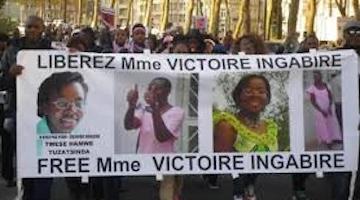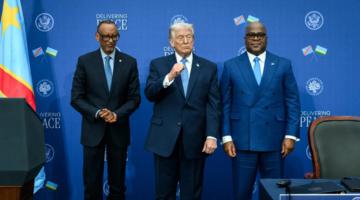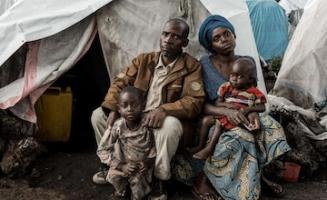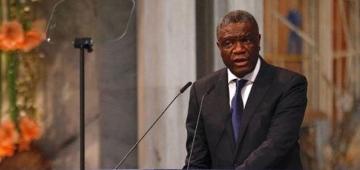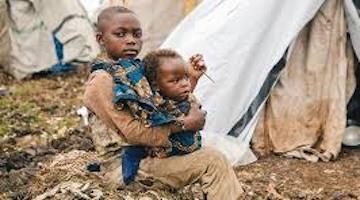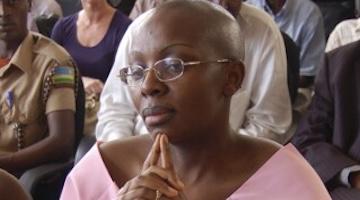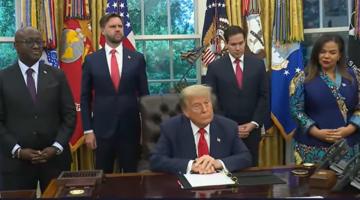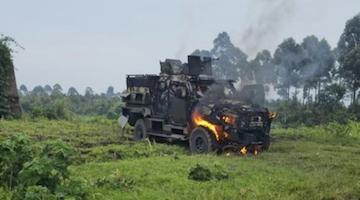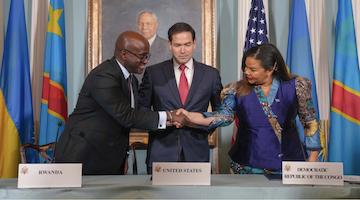The African Court of Human and People's Rights in Arusha, Tanzania.
Western courts have imposed imperial justice on Africa, but African courts promise judicial sovereignty.
The Congolese Action Youth Platform, Dr. Denis Mukwege, and The Case for the Land have called for an international court to prosecute crimes committed during the 30-year war and conflict in the Democratic Republic of the Congo. During that time Rwanda and Uganda have repeatedly invaded and occupied DRC, massacred Congolese people and Rwandan refugees, looted the country’s resources, and waged wars that led to the overthrow of two Congolese governments. I spoke to Bénédicte Njoko of The Case for the Land.
ANN GARRISON: Bénédicte, what is the thinking behind the call for an international court to prosecute crimes committed in Congo?
BENEDICTE NJOKO: Well, looking at the conflict in the Congo that has been going on for 30 years now, it seems important to put the question of justice into the conversation and establish a court. Everybody has an agenda regarding Congo, most of all those looting its resources, but nobody has a justice agenda for Congo. A court is an essential tool for creating a justice agenda, ending criminal impunity, and stopping the war.
AG: Courts created by the UN Security Council to prosecute crimes committed within one nation have been infamously agendized to create and bolster Western imperial narratives. The International Criminal Tribunal for the Former Yugoslavia (ICTY) was used to justify NATO bombing and the balkanization of Yugoslavia, and the International Criminal Tribunal for Rwanda (ICTR) also served Western purposes. The ICTR began with judicial notice, the assumption of facts that didn't have to be proven, which were that there was a Tutsi genocide in Rwanda and that the Hutu were guilty.
The court ignored the far more complex reality of inter-ethnic and politically motivated massacres and never indicted a single Tutsi. The narrative it created then became the Tutsi supremacist Rwandan regime’s excuse for its war in Congo. It has claimed for the last 30 years, as millions of Congolese people have died, that it is protecting Congolese Tutsis from another genocide.
The West, and most of all the US, pay for the international courts, and have thus been able to shape their narratives. They imposed the Tutsi genocide narrative because they had chosen the Tutsi as their proxies to control Congo’s resource wealth.
BN: Yes, the court for Rwanda was established in the name of justice, but it merely functioned, in many ways, as an imperialist tool. It also reflected, I think, the power dynamics of a global system where Africans and African sovereignty is subordinated to Western political interests.
We nevertheless need to propose something constructive. We need to resist and rebuild justice, maybe from the ground up. I think that one way of escaping that imperialist judicial narrative is to try first to strengthen local justice systems. We know that this is difficult for Congo because the country is in such a mess after 30 years of war and occupation, and the government is not functioning well, but it is important to try. I don't remember exactly what year it was, but there was a case where we had a military court in Congo that issued a judgment condemning some armed groups for genocide against Congolese people.
I think we need to think outside the box on how to establish sovereign African judicial systems that can’t be undermined by Western interests. We need to ensure that African voices are not marginalized.
We now see judges of the International Criminal Court who are not Westerners, but they’re still serving Western agendas. Judges, prosecutors, and legal experts must be from the continent in cases about the continent. Not as tokens, but as decision makers. We can’t expect justice from courts that were steered by those who were silent or complicit in crimes in Congo and elsewhere in Africa.
We need also to expose and resist the double standards. No justice system can be credible if it selectively prosecutes the losers in a conflict, as it did at the ICTY and the ICTR.
We need to invest in independent, continental, African-led legal structures.
This may mean to strengthen and expand the mandate of the African Court on Human and Peoples’ Rights, and to train a new generation of lawyers who understand international and African realities.
Lastly, I think that a court should really be centered on all the victims. The UN Mapping Report on Human Rights Abuse in the DRC is important because it gives voices to all the victims. This is not just about prosecuting the Tutsis. It's not just about prosecuting the Hutus or the Congolese but about establishing justice for all the victims who have lost their lives in Congo for the last three decades.
AG: I want to talk about the African Court, but first let’s talk a bit more about the problems with the Western courts, including the ICC. The ICC has said that it's going to start prosecuting individuals for crimes in Congo, but it’s already done that. Most notably, it prosecuted Bosco Ntaganda, who
was born in Rwanda, but more importantly, fought under then General Paul Kagame’s command in the Rwandan Civil War. Ntaganda fought in Congo as a commander in the CNDP militia which later became the M23.
In its final 2008 report, the UN Group of Experts on DRC said it had evidence that Rwandan authorities recruited soldiers, including children, supplied military equipment, and sent their own commanders and troops into Congo to support the CNDP. After the CNDP started fighting again as M23, the 2014 report said that M23 was under Rwandan command, as did the June and December 2024 reports.
So whether Ntaganda became a Congolese citizen or not, he spent his life fighting under Rwandan command. Court records said they had identified him as a Rwandan, but on his first day in court, back in 2013, he stood up and claimed that he was Congolese, and the court then tried him as such, sentencing him to 30 years. This made it look like the “international community” was fighting impunity when in fact it was reinforcing it by deflecting attention from Kagame’s regime and its Western sponsors.
BN: Exactly. Ntaganda’s conviction was actually a tragedy for Congolese people. It affirmed the Western imperialist narrative, which has long been that Congo is mired in a civil war, that it doesn't suffer from external aggression but from internal problems. I’m sure that’s why they simply accepted Ntaganda’s claim to be Congolese instead of challenging it with facts repeatedly documented in the reports you mentioned.
The civil war narrative has become harder and harder to defend as mainstream media quote UN reports that Rwanda is in Congo, but now we have your US Congressman Ronny Jackson, Chair of your House Armed Services Committee, repeating Kagame’s claim that Eastern DRC used to be Rwanda. This implies his support for the annexation of Congolese provinces that has been Kagame’s goal all along.
AG: The ICC has indicted heads of state including Vladimir Putin, Ivory Coast’s President Laurent Gbagbo, Liberian President Charles Taylor, and Libyan President Muammar Gaddafi, whom the US had assassinated before he could be brought to trial, but it will never indict Kagame.
BN: No, he has been too useful, not only in controlling Congolese resources but also in policing the continent in Western interests. This same Congressman Jackson who told Congress that eastern Congo used to be Rwanda just met with Kagame in Kigali to discuss ongoing military cooperation.
AG: International criminal defense attorney Christopher Black said they will never indict Kagame or his top officers because they’d start talking about Western officials’ complicity in their crimes to save their own necks.
BN: That’s quite likely, and another problem with the ICC is that it can only indict individuals, not governments or the multinational corporations who have knowingly purchased minerals that Rwanda has stolen from Congo and even had direct dealings with warlords. The Mapping Report said that none of the violence would have taken place if it weren’t for these buyers.
AG: So let’s talk about the African Court of Human and Peoples’ Rights. DRC has brought a case against Rwanda. On February 12th, the Congolese Deputy Minister of Justice addressed the court, and here I’ll read some of his opening remarks.
“Today, the African Court on Human Rights is opening the trial against Paul Kagame’s Rwanda, which is slaughtering people in Congo, plundering our wealth and even raping babies. These acts have already caused more than 13 million deaths and 6.3 million internally displaced persons, meaning people driven from their villages to exploit Congo’s resources.” He said he based the case on several reports, including those of the United Nations.
What do you think of the prospect for this African Court in dealing with this issue?
BN: I think we need to draw as much attention to that case as we can because whatever the outcome, it is a demand for justice based on the realities deflected by the Western courts. We need to work with what is available and also call for investment in African legal infrastructure. We keep talking to Westerners, often appealing to them for justice in the very crimes they are complicit in, and that has caused us to neglect what the continent can do.
With what is happening in the Sahel with Burkina Faso, Mali, and Niger, there is now a shift, something is happening. And if you listen to African youth, you hear that they are not willing to be told what they need to do.
This is a youth that aspires to be really independent, to fight for their sovereignty, including their judicial sovereignty. We need to keep pushing in that direction, invest in African legal infrastructure, and train a new generation of lawyers, then tell the international community that we don’t need them to prosecute crimes in Africa.
Even if it went wrong at the end, I always think about Guatemala and all the things that happened with Rios Montana and after that. You had judges in Guatemala who said that what had been done to the indigenous people was a genocide. Of course, this ruling was then revoked because the sitting president was also involved in those crimes, but this is a country that, at a certain point, told the West that even if it wouldn’t acknowledge what had happened there, they would do it themselves.
We Africans need to take examples like that and be confident that once we strengthen our own legal systems, we can achieve real justice and establish true narratives about what happens on the continent.
I'm hopeful because, as I was saying, I see this new youth. I see determined African youth and not just on the continent, but also in the African diaspora in Europe, maybe less in the United States but there as well. They are looking to the Sahel States and questioning global power dynamics, and they want to see African sovereignty.
AG: In 2017, I had the chance to interview Cameroonian jurist Chief Charles Taku and I read his essays in Justice Belied: The Unbalanced Scales of International Justice, an excellent book. He said that he has great belief in the potential of this African Court. It's not there yet. A number of courts haven't accepted various forms of its jurisdiction, and it doesn't yet have criminal jurisdiction. The African Union decided to study the possibility of that.
It will also have to have the buy-in of other African nations regarding enforcement. The International Criminal Court relies on the collaboration of other states; it counts on them to arrest those they’ve indicted in their territory, and of course European states are now refusing to arrest Netanyahu, even though he’s been indicted.
Chief Taku said there’s a lot of work to be done, but again, he believes in the potential of the African court.
BN: I second that and, again, I’m optimistic when I see the determination of African youth.
Ann Garrison is a Black Agenda Report Contributing Editor based in the San Francisco Bay Area. In 2014, she received the Victoire Ingabire Umuhoza Democracy and Peace Prize for her reporting on conflict in the African Great Lakes region. She can be reached at ann@anngarrison.com. You can help support her work on Patreon.

